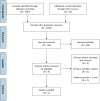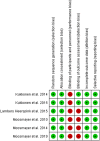Conservative versus surgical management for patients with rotator cuff tears: a systematic review and META-analysis
- PMID: 33419401
- PMCID: PMC7796609
- DOI: 10.1186/s12891-020-03872-4
Conservative versus surgical management for patients with rotator cuff tears: a systematic review and META-analysis
Erratum in
-
Correction to: Conservative versus surgical management for patients with rotator cuff tears: a systematic review and META-analysis.BMC Musculoskelet Disord. 2021 Sep 2;22(1):752. doi: 10.1186/s12891-021-04525-w. BMC Musculoskelet Disord. 2021. PMID: 34474674 Free PMC article. No abstract available.
Abstract
Background: This study aims to compare conservative versus surgical management for patients with full-thickness RC tear in terms of clinical and structural outcomes at 1 and 2 years of follow-up.
Methods: A comprehensive search of CENTRAL, MEDLINE, EMBASE, CINAHL, Google Scholar and reference lists of retrieved articles was performed since the inception of each database until August 2020. According to the Cochrane Handbook for Systematic Reviews of Interventions, two independent authors screened all suitable studies for the inclusion, extracted data and assessed risk of bias. Only randomised controlled trials comparing conservative and surgical management of full-thickness RC tear in adults were included. The primary outcome measure was the effectiveness of each treatment in terms of Constant-Murley score (CMS) and VAS pain score at different time points. The secondary outcome was the integrity of the repaired tendon evaluated on postoperative MRI at different time points. The GRADE guidelines were used to assess the critical appraisal status and quality of evidence.
Results: A total of six articles met the inclusion criteria. The average value of CMS score at 12 months of follow-up was 77.6 ± 14.4 in the surgery group and 72.8 ± 16.5 in the conservative group, without statistically significant differences between the groups. Similar results were demonstrated at 24 months of follow-up. The mean of VAS pain score at 12 months of follow-up was 1.4 ± 1.6 in the surgery group and 2.4 ± 1.9 in the conservative group. Quantitative synthesis showed better results in favour of the surgical group in terms of VAS pain score one year after surgery (- 1.08, 95% CI - 1.58 to - 0.58; P < 0.001).
Conclusions: At a 2-year follow-up, shoulder function evaluated in terms of CMS was not significantly improved. Further high-quality level-I randomised controlled trials at longer term follow-up are needed to evaluate whether surgical and conservative treatment provide comparable long-term results.
Keywords: Conservative treatment; Pain; Physiotherapy; Rotator cuff; Rotator cuff repair; Rotator cuff tear; Shoulder; Surgery; Surgical treatment.
Conflict of interest statement
UGL and AB are members of the Editorial Board of BMC Musculoskeletal Disorders. The remaining authors declare that they have no conflict of interest.
Figures
References
Publication types
MeSH terms
Grants and funding
LinkOut - more resources
Full Text Sources
Other Literature Sources
Medical
Miscellaneous






